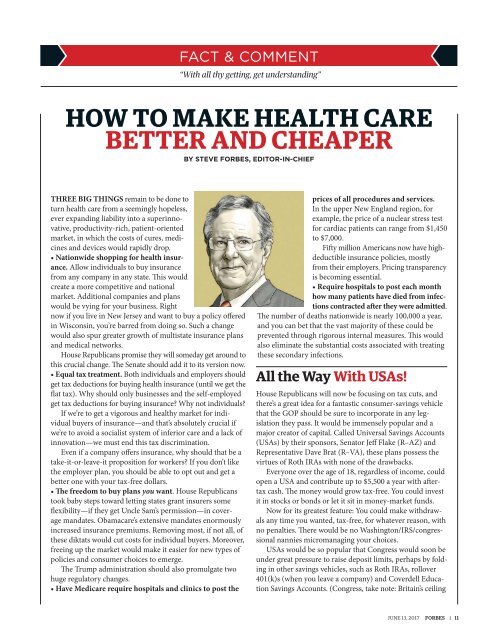You also want an ePaper? Increase the reach of your titles
YUMPU automatically turns print PDFs into web optimized ePapers that Google loves.
FACT & COMMENT<br />
“With all thy getting, get understanding”<br />
HOW TO MAKE HEALTH CARE<br />
BETTER AND CHEAPER<br />
BY STEVE FORBES, EDITOR-IN-CHIEF<br />
THREE BIG THINGS remain to be done to<br />
turn health care from a seemingly hopeless,<br />
ever expanding liability into a superinnovative,<br />
productivity-rich, patient-oriented<br />
market, in which the costs of cures, medicines<br />
and devices would rapidly drop.<br />
t/BUJPOXJEFTIPQQJOHGPSIFBMUIJOTVS-<br />
BODF Allow individuals to buy insurance<br />
from any company in any state. This would<br />
create a more competitive and national<br />
market. Additional companies and plans<br />
would be vying for your business. Right<br />
now if you live in New Jersey and want to buy a policy offered<br />
in Wisconsin, you’re barred from doing so. Such a change<br />
would also spur greater growth of multistate insurance plans<br />
and medical networks.<br />
House Republicans promise they will someday get around to<br />
this crucial change. The Senate should add it to its version now.<br />
t&RVBMUBYUSFBUNFOU Both individuals and employers should<br />
get tax deductions for buying health insurance (until we get the<br />
flat tax). Why should only businesses and the self-employed<br />
get tax deductions for buying insurance? Why not individuals?<br />
If we’re to get a vigorous and healthy market for individual<br />
buyers of insurance—and that’s absolutely crucial if<br />
we’re to avoid a socialist system of inferior care and a lack of<br />
innovation—we must end this tax discrimination.<br />
Even if a company offers insurance, why should that be a<br />
take-it-or-leave-it proposition for workers? If you don’t like<br />
the employer plan, you should be able to opt out and get a<br />
better one with your tax-free dollars.<br />
tćFGSFFEPNUPCVZQMBOTyouXBOU. House Republicans<br />
took baby steps toward letting states grant insurers some<br />
flexibility—if they get Uncle Sam’s permission—in coverage<br />
mandates. Obamacare’s extensive mandates enormously<br />
increased insurance premiums. Removing most, if not all, of<br />
these diktats would cut costs for individual buyers. Moreover,<br />
freeing up the market would make it easier for new types of<br />
policies and consumer choices to emerge.<br />
The Trump administration should also promulgate two<br />
huge regulatory changes.<br />
t)BWF.FEJDBSFSFRVJSFIPTQJUBMTBOEDMJOJDTUPQPTUUIF<br />
QSJDFTPGBMMQSPDFEVSFTBOETFSWJDFT<br />
In the upper New England region, for<br />
example, the price of a nuclear stress test<br />
for cardiac patients can range from $1,450<br />
to $7,000.<br />
Fifty million Americans now have highdeductible<br />
insurance policies, mostly<br />
from their employers. Pricing transparency<br />
is becoming essential.<br />
t3FRVJSFIPTQJUBMTUPQPTUFBDINPOUI<br />
IPXNBOZQBUJFOUTIBWFEJFEGSPNJOGFD-<br />
UJPOTDPOUSBDUFEBęFSUIFZXFSFBENJUUFE.<br />
The number of deaths nationwide is nearly 100,000 a year,<br />
and you can bet that the vast majority of these could be<br />
prevented through rigorous internal measures. This would<br />
also eliminate the substantial costs associated with treating<br />
these secondary infections.<br />
All the Way With <strong>USA</strong>s!<br />
House Republicans will now be focusing on tax cuts, and<br />
there’s a great idea for a fantastic consumer-savings vehicle<br />
that the GOP should be sure to incorporate in any legislation<br />
they pass. It would be immensely popular and a<br />
major creator of capital. Called Universal Savings Accounts<br />
(<strong>USA</strong>s) by their sponsors, Senator Jeff Flake (R–AZ) and<br />
Representative Dave Brat (R–VA), these plans possess the<br />
virtues of Roth IRAs with none of the drawbacks.<br />
Everyone over the age of 18, regardless of income, could<br />
open a <strong>USA</strong> and contribute up to $5,500 a year with aftertax<br />
cash. The money would grow tax-free. You could invest<br />
it in stocks or bonds or let it sit in money-market funds.<br />
Now for its greatest feature: You could make withdrawals<br />
any time you wanted, tax-free, for whatever reason, with<br />
no penalties. There would be no Washington/IRS/congressional<br />
nannies micromanaging your choices.<br />
<strong>USA</strong>s would be so popular that Congress would soon be<br />
under great pressure to raise deposit limits, perhaps by folding<br />
in other savings vehicles, such as Roth IRAs, rollover<br />
401(k)s (when you leave a company) and Coverdell Education<br />
Savings Accounts. (Congress, take note: Britain’s ceiling<br />
JUNE <strong>13</strong>, <strong>2017</strong> FORBES | 11


















